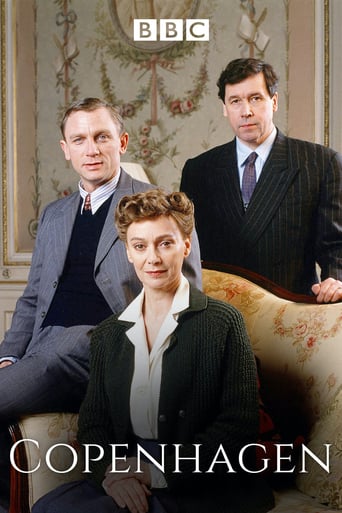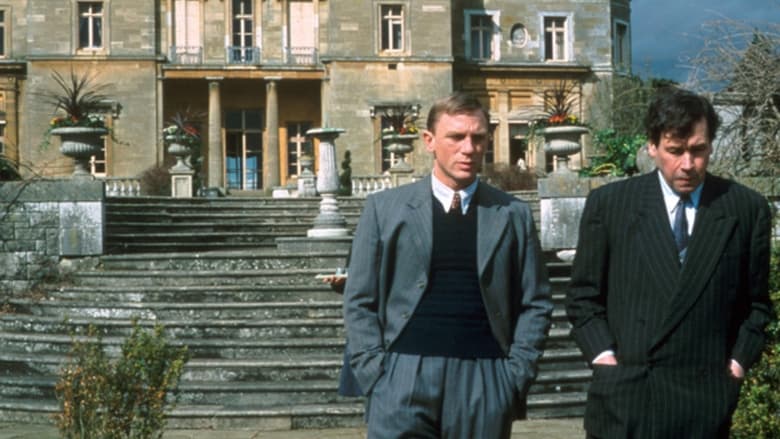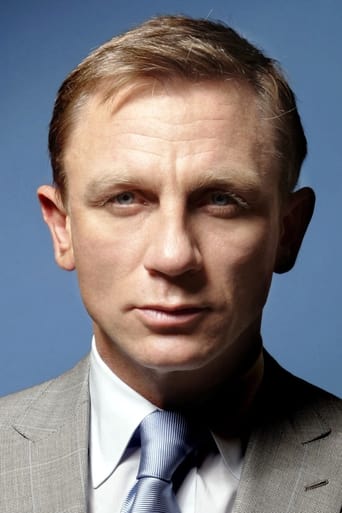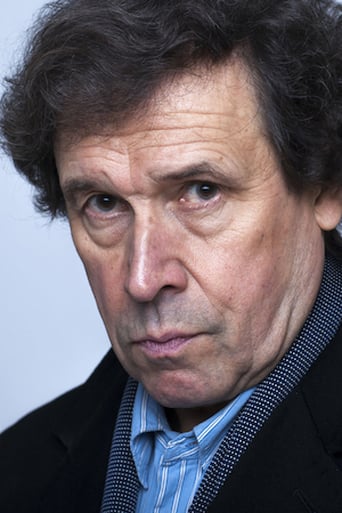Copenhagen (2002)
No one knows for sure what transpired when German physicist Werner Heisenberg met with his Jewish Danish counterpart, Niels Bohr, in Copenhagen -- the event became the stuff of modern scientific mythology. Director Howard Davies puts his spin on the momentous meeting that occurred one night in September 1941, during which the longtime friends entered into a dangerous discussion about physics and politics.
Watch Trailer
Cast
Reviews
People are voting emotionally.
Although it has its amusing moments, in eneral the plot does not convince.
Like the great film, it's made with a great deal of visible affection both in front of and behind the camera.
It is an exhilarating, distressing, funny and profound film, with one of the more memorable film scores in years,
In the late 1920s, Werner Heisenberg and Niels Bohr worked closely together to formulate the "Copenhagen interpretation", a philosophical synthesis that provided a basis for understanding the radical new field of quantum mechanics that they (and others) had recently developed. But when world war two broke out, Heisenberg's country (Germany) invaded Bohr's (Denmark): Bohr was eventually to leave home and contribute to the successful allied efforts to develop a nuclear weapon, whereas Heisenberg led the failed German program. But in 1941, when Bohr still lived in Denmark, Heiseberg visited him, and the subject of that meeting has subsequently become a matter of speculation and controversy. Bohr felt that Heisenberg had come on an intelligence-gathering mission and sent him packing; Heisenberg claimed that his (poorly formulated) aim had been to establish a consensus among physicists, to promote continued research into the nature of the atom while denying a weapon to their political masters on both sides. Heisenberg continued to claim, after the war, that he hadn't wanted to build a bomb for the Nazis; but it seems likely that he had not been in a position to do so anyway having failed to conceive one essential idea. If Heisenberg was not a saint, this does not make him a figure of pure evil either: indeed, while the evils of Nazism make him easy to condemn, it's surely also easy to understand the pressures on a patriotic man trying to pursue his great love, theoretical physics, when his country was ruled by monsters. In Michael Frayn's play, 'Copenhagen', now adapted for television, Heisenberg is depicted as a man racked by uncertainty: if his approach to Bohr was confused, Frayn suggests that Heisenberg himself didn't really know what he wanted, at least not in the context of a world at war. As one of Heisenberg's own contributions to physics is known as the "uncertainty principle", there's an open goal for that the dramatist cannot resist, and he frames his imaginative reconstruction of the two men's encounter (whose substance is well-documented) in the language of physics itself, using analogies to their great research to describe their personal outlooks and predicaments. Though probably not literally accurate, it's skilfully done, and as well as exploring the ambiguities of their situation, also makes one interested in the physics itself; the three person cast are all excellent in this version.
"Copenhagen" explores a little known meeting between two top physicists, one German and one Danish, from several perspectives, all of them speculative, during WWII when theoretical physics was on the threshold of unleashing the power of the atom and creating the ultimate weapon. Originally made for the more refined and heady tastes of PBS viewers, this film delves into the esoterics of this meeting of the minds asking more questions than it answers and in doing so delivers much food for thought. I was attracted to the film because I majored in physics in college and found this ensemble drama fascinating. However, I watched "Romy & Michele's High School Reunion" last night and found it much more entertaining. Recommended for those relative few interested in the history of physics. (B)Note - If you watch this film, don't miss the epilogue.
This is well done and thoroughly enjoyable portrayal of the moral hesitation and dissembling that go hand and hand with Heisenberg and his efforts with respect to the bomb. It is well acted with informative and intelligent dialogue that brings two of the leading scientists of the 20th century to life while examining all facets of the issues surrounding Heisenberg's visit to Copenhagen and the consequences of his efforts to develop a bomb for Nazi Germany.
What a great film. I was blown away by the questions this film asked. I had always assumed that Heisenberg was basically a Nazi and really was developing the atom bomb for Hitler only to fall short because he did not have the time or ability or support. But this play and film draws that totally into question. Regardless of whether that speculation is valid, it is a wonderful look at the ethics of science. After seeing this film on PBS last year, when I saw it was going to be a play at a local theater, I had to go see that version as well. Both versions have their strong points and both were enjoyable. If you're a scientist or interested in science, I highly recommend seeing either the play, the film or both.






